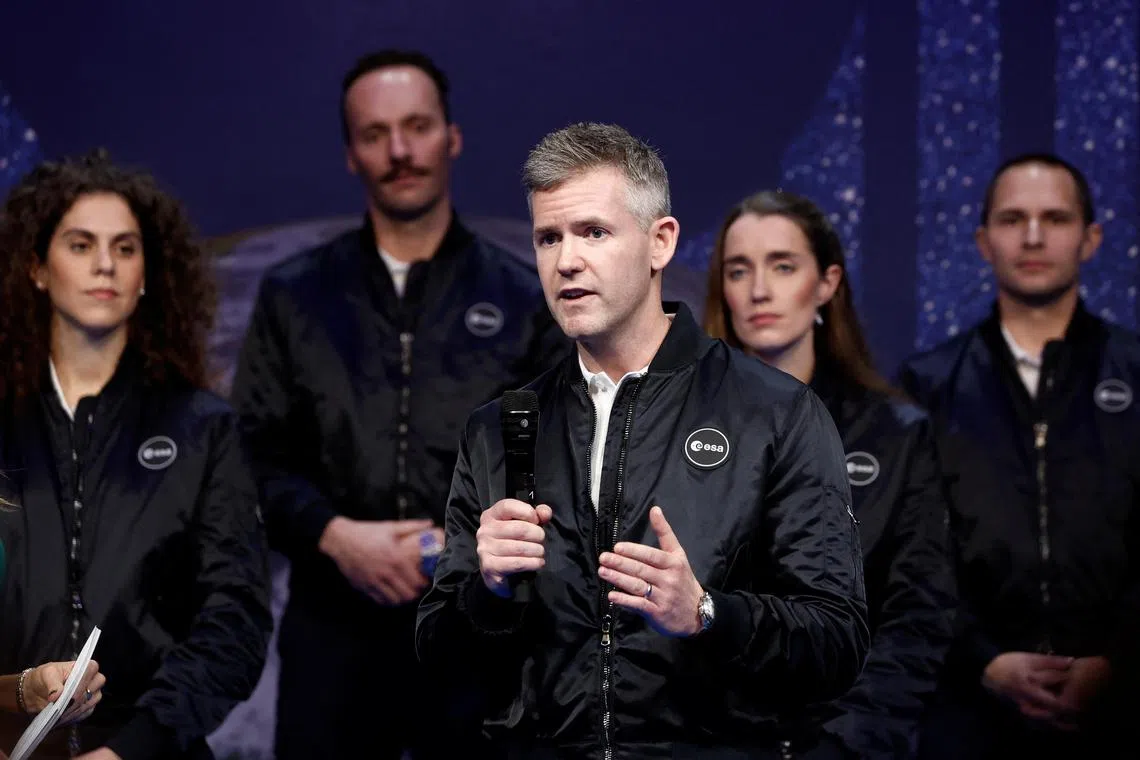Europe flags space ambitions with spending hike and new astronauts
Sign up now: Get ST's newsletters delivered to your inbox

Former British Paralympic sprinter John McFall (centre) is part of a new generation of 17 recruits picked for ESA astronaut training.
PHOTO: REUTERS
PARIS - European nations agreed on Wednesday to boost spending on space by 17 per cent to stay on the heels of the United States and China, in two days of intense bargaining overshadowed by rising energy prices.
The European Space Agency (ESA) said its 22 member states had agreed to provide €16.9 billion (S$24.2 billion) for projects from the search for past life on Mars to climate research in 2023-2025, up from €14.5 billion in the previous period.
“Europe is ambitious in space and that is an important signal being sent here from Paris,” said German aerospace coordinator Anna Christmann, after chairing the bartering round between ministers held every three years.
ESA also named astronaut recruits, including the first ever “Parastronaut”, British Paralympic athlete John McFall.
Dr McFall was part of a new generation of 17 recruits picked for astronaut training.
He will take part in a feasibility study designed to allow ESA to assess the conditions needed for people with disabilities to take part in future missions.
“I’m proud of myself that I got through the selection process,” Dr McFall said in an interview posted on ESA’s website.
“It’s been quite a whirlwind experience, given that as an amputee, I’d never thought that being an astronaut was a possibility, so excitement was a huge emotion”.
The 31-year-old doctor will help ESA engineers design changes in hardware needed to open professional spaceflight to a wider group of qualified candidates, the agency said.
“I think the message that I would give to future generations is that science is for everyone and space travel, hopefully, can be for everyone,” Dr McFall said.
Paris-based ESA had asked its 22 nations to come up with €18.5 billion to fund rocket launches, satellites and Europe’s participation in planetary research.
ESA director-general Josef Aschbacher said the €2.4 billion of extra pledges marked a significant achievement given troubled economies, but acknowledged that programmes would be adjusted to meet a gap, with the extra €4 billion that ESA had wanted.
The agreement leaves Europe trailing the US and closely watching China, whose space budgets are not public but which has made space exploration and research a top priority.
But officials said Europe remained a leader in Earth observation including climate research, after signing up to a record increase and hitting goals at a previous meeting in 2019.
ESA, whose Ariane rocket pioneered commercial launches but now faces delays and intense competition from billionaire Elon Musk’s SpaceX, is seeking to maintain a key role in space while balancing political constraints of its large and small nations.
Top contributor Germany dug its heels in over aspects of the proposed package as talks ran long, another delegate said.
France and Germany have been jostling for influence at ESA in recent years.
But Berlin overtook Paris as the biggest contributor in a 2019 move that took the French government by surprise and created tensions between the two countries. REUTERS


